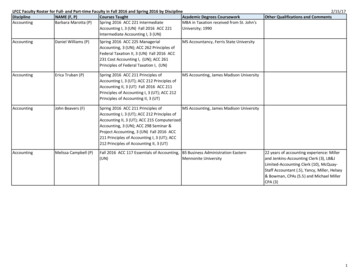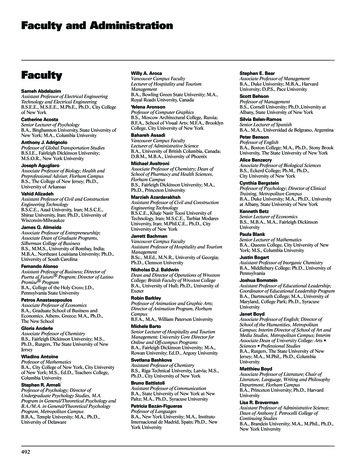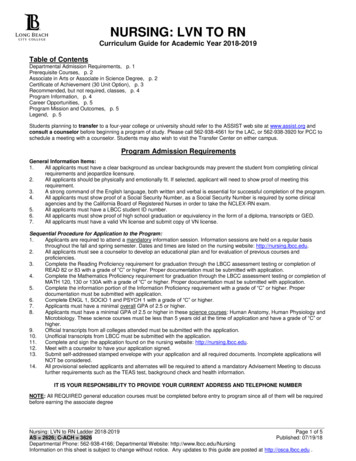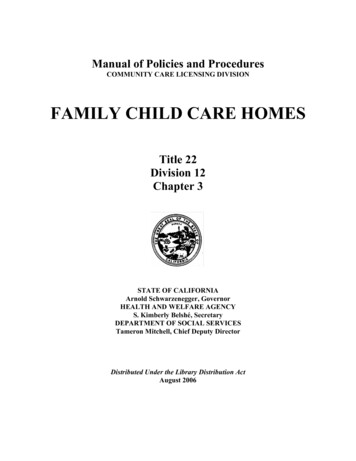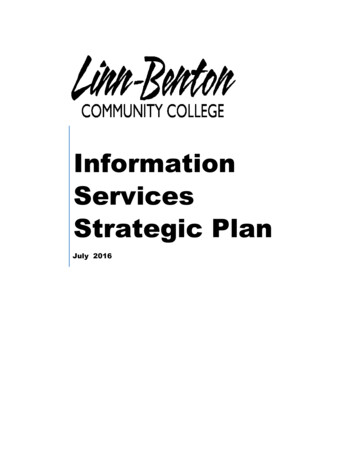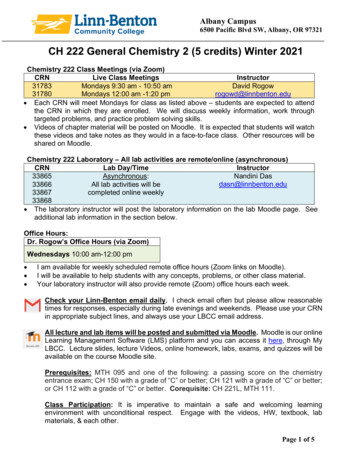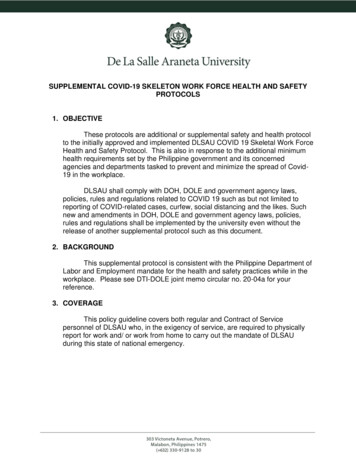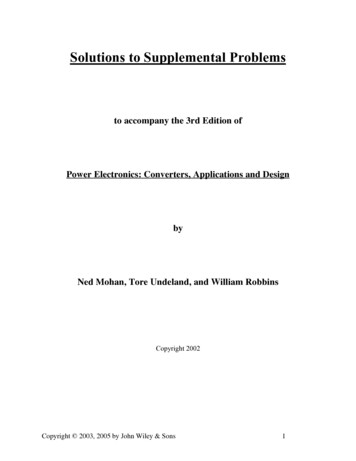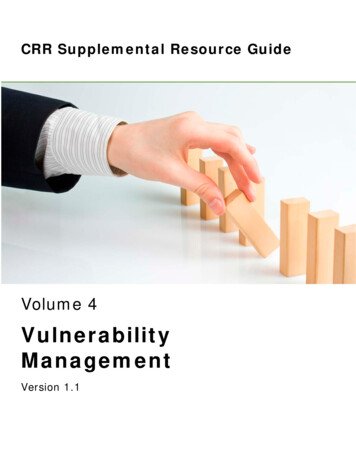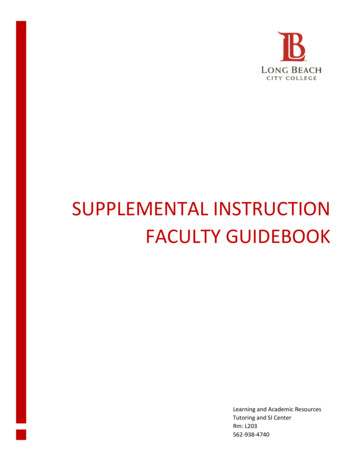
Transcription
SUPPLEMENTAL INSTRUCTIONFACULTY GUIDEBOOKLearning and Academic ResourcesTutoring and SI CenterRm: L203562-938-4740
CONTENTSSupplemental Instruction (SI) . 1Overview . 1Key Elements of Supplemental Instruction. 1Program details . 1Role of the SI Leader . 1What goes on during SI sessions? . 2What is the SI Leader NOT permitted to do? . 2Expectations . 3Communication . 3Resources . 3Promotion of SI . 3Additional infommation about SI Option 2 – Workshop Modules . 4Overview . 4Program Details. 4Expectations . 4Communication . 4Resources . 4Promotion . 4Management of SI Leaders . 5
SUPPLEMENTAL INSTRUCTION (SI)OVERVIEWSupplemental Instruction (SI), first developed at the University of Missouri, Kansas City in 1973, is a voluntaryacademic assistance program that uses peer-led study groups to help students succeed in traditionally difficultcourses –those with high unsuccessful completion rates. The goal of SI is to help students master coursecontent while developing effective learning, critical thinking, and study strategies.SI offers regularly scheduled study sessions, led by SI Leaders, to assist students with course content and studyskills. In addition, students have an opportunity to work together to compare notes, discuss readings, anddevelop organizational tools. SI Leaders have demonstrated academic competency in the subject area, and aretrained in facilitating group activities using collaborative learning methods.Data collected by the International Center for Supplemental Instruction at the University of Missouri-KansasCity from 719 institutions in the United States and 146 institutions in twelve other countries demonstrates twokey findings:1. Students participating in SI earn higher course grades and withdraw less often than non-SI participants.2. The more sessions a student attends, the higher the final course grade.KEY ELEMENTS OF SUPPLEMENTAL INSTRUCTION*Note: LBCC offers two modified versions of the traditional SI Model. Option 1 offers week to week coursecontent study sessions. Options 2 offers general topics workshop modules. Additional details for option 2 isprovided below. SI consists of bi-weekly scheduled, out-of-class, peer facilitated review sessions. Students learn to combinehow to learn with what to learn.Participation in SI is voluntary, free, and open to all students from all sections of the supported course.SI Leaders regularly attend course lectures and/or meet with Instructors for the supported course.SI Leader training includes discussion and application of how students learn, group facilitation methods,study techniques, and strategies for improving academic performance.Supplemental Instruction avoids a remedial stigma by focusing on classroom skills rather than individualstudents.SI Leaders encourage students to process the material. SI Leaders are not considered experts in thesubjects and they do not re-lecture to students.PROGRAM DETAILSROLE OF THE SI LEADERSI Leaders serve as facilitators for SI group study sessions. This role requires the SI Leader to attend thetargeted course (similar to auditing) and/or to meet with the Instructor to ensure constant and consistentknowledge of the lecture material and classroom expectations. The SI Leader’s role in the classroom is tomodel effective classroom behavior and then transfer that knowledge to the SI session. Through collaborativelearning strategies, the SI sessions integrate the review of lecture notes, textbook readings, outsidesupplemental readings along with appropriate modeling of learning strategies. “How to learn” is embeddedinto SI sessions along with “what to learn.” Through practice and mastery of effective learning strategies,students can adopt and transfer these strategies to other subjects and content areas.January, 2016LBCC Supplemental Instruction Faculty Guidebook1
The SI Leader is not in the classroom to answer questions or serve in any official capacity, such as proctoringtests. However, the SI Leader does have these responsibilities: Attend lectures and/or regularly meet with Instructor.Be a visible presence to the students in the class.Act as a model student during lectures – listen and take notes, help facilitate group discussions.Read assigned texts and supplemental materials.Communicate with Instructor to discuss SI session strategies and activities.Organize and facilitate a minimum of two hours of regular study sessions per week.Design and distribute SI promotional materials.Communicate with students to encourage participation (announcements during class or via email, LARwebsite, or a designated social media group).If possible, attend class on test days to review the exam and hold post-test debriefing.Communicate with the SI Coordinator and attend SI in-service trainings.WHAT GOES ON DURING SI SESSIONS?A typical SI session is an hour or hour and a half-long meeting that takes place in a classroom or meeting roomon campus. It may include a review of lecture material and assigned readings, group work and discussions,problem-solving and critical thinking activities or a mock exam. The SI Leader’s primary focus is to assiststudents in understanding the course material while helping them develop effective study skills that areapplicable to the content. The SI Leaders will never structure sessions as a forum to re-lecture to students whomissed class.WHAT IS THE SI LEADER NOT PERMITTED TO DO? The SI Leader is not a “teaching assistant” or any other type of “personal assistant” and the SI Leader existssolely as a student resource. The SI Leader is NOT to grade any assignments or exams, take attendance, orperform clerical duties, such as copying syllabi or classroom materials for the Instructor. It is important forSI Leaders to maintain their peer status among the students in the class. SI Leaders are paid to keep upwith the material and run study group sessions.SI Leaders typically do not answer questions you ask the class as they are not there as students. Althoughthey still serve as a model student (listening, taking notes ), the SI Leaders are in class to get a bettersense of the areas emphasized during lectures so that they can design and develop more focused SIsessions.The SI Leader is NOT permitted to lecture for you, help you construct exam items or participate indetermining a student’s grade. The SI Leader is not a teacher. To assume that they could fill in would placethem in a teaching role.6/23/2015LBCC Supplemental Instruction Faculty Guidebook2
EXPECTATIONSFor SI to achieve its highest potential effectiveness for the students, collaboration between the SI Leader andInstructor is imperative.COMMUNICATIONCommunication between Instructor and SI Leaders should occur regularly. SI Leaders can attend class (on arotating basis if supporting multiple sections), and hold regular meetings with the Instructor outside of classtime and via email to keep Instructor appraised of what’s happening in the SI sessions. SI Leaders will alsoinform Instructors of specific content related questions students are asking about, point out areas where thestudents are struggling, discuss the level of class participation, and offer Instructor advance review of studyaids, such as mock exams.RESOURCESInstructors should share resources with SI Leaders such as: syllabus, handouts, practice tests, coursetextbooks, online course materials, etc. If Instructor uses online learning platforms such as Google Docs orMoodle, SI Leaders should be given access as well.PROMOTION OF SI During the first week of classes, the SI Leader will give an introductory speech and invite students toattend the SI sessions. They will announces the tentative SI session schedule for term, and distribute flyerswith pertinent information about the SI session schedule. If possible, we will ask SI Leaders to provide acopy of the flyer or a simple bio to be attached to the syllabus that will be given to students.After the first week, we ask that SI Leaders be allowed a few minutes at the start of lectures forsubsequent announcements and to remind students of the SI schedule, content of SI sessions andencourage ongoing participation.SI Leaders may also announce in advance, content of SI sessions via email or postings on their website, or adesignated social media group.Class content should be confirmed and/or made available to the SI Leader at least a week in advance.Instructor endorsement of SI for all students, not just those who struggle, also helps to eliminate thestigma that only those who are failing the course should attend. The combination of high-and lowperforming students in SI sessions provides a collaborative and less threatening environment, wherestudents learn from each other in a more intimate setting.Instructors can also support SI by periodically making announcements about SI (classroom lectures,syllabus, LMS-Moodle). SI prompts from the Instructor reminds students of its availability and encouragesparticipation in a positive manner.6/23/2015LBCC Supplemental Instruction Faculty Guidebook3
ADDITIONAL INFOMMATION ABOUT SI OPTION 2 – WORKSHOP MODULESOVERVIEWThis option is ideal for courses that may not need such detailed content support. If the course has overallgeneral topics that tend to give students difficulty, and those topics are addressed at different timesthroughout the semester, the department can request the Module Workshop option. The support would beprovided to ALL students taking that class regardless of instructor. The department would decide whichworkshop topics they would like the SI Leader(s) to deliver throughout the semester. The workshop materialscould be provided by the department or developed in collaboration with the SI Leader. The workshop topicscould be repeated several times throughout the semester to coincide with a specific class schedule, or whenthe class is ready for that topic, the faculty could then request the corresponding workshop module.PROGRAM DETAILS SI Leaders may hold up to 4-6 workshops each week. The majority of their prep time would occur atthe beginning of the semester.Study sessions will include guided activities as well as open sessions for students to drop in to askspecific content related questions.Study sessions may focus on developing study skills, test taking skills, test reviews, post-test follow-up,learning strategies, in addition to content knowledge. A schedule of when each topic would bepresented could be decided ahead of time and a calendar could be shared with the students at thebeginning of the term.SI Leaders will provide regular communication with students to inform them of session topics via emailand postings on their website or a designated social media group.EXPECTATIONSFor Option2 - the Workshop Module to achieve its highest potential effectiveness for the students,collaboration between the SI Leader and an appointed Faculty Liaison or Lead Faculty is imperative.COMMUNICATIONCommunication between an appointed Faculty Liaison and SI Leaders should occur regularly. SI Leaders mayhold regular meetings with the Faculty Liaison outside of class time and via email to determine and discussoverall content that will be covered, keep Instructors appraised of what’s happening in the SI sessions, informFaculty of specific content area questions students are asking about, point out areas where the students arestruggling, and discuss the level of class participation.RESOURCESThe Faculty Liaison should share resources with SI Leaders such as: syllabus, handouts, practice tests, coursetextbooks, online course materials, etc. If Instructors use online learning platforms such as Google Docs orMoodle, SI Leaders should be given access as well.PROMOTION During the first few weeks of classes, SI Leaders or other LAR support staff can visit upon request yourcourse to inform students about the program and share pertinent information about session times.SI Leaders may also announce in advance to students via email or postings on the LAR website or adesignated social media group, content of SI Workshop Module sessions.6/23/2015LBCC Supplemental Instruction Faculty Guidebook4
Faculty endorsement of SI workshops for all students, not just those who struggle, also helps to eliminatethe stigma that only those who are failing the course should attend. The combination of high-and lowperforming students in SI workshop sessions provides a collaborative and less threatening environment,where students learn from each other in a more intimate setting.Faculty can also support SI workshops by periodically making announcements about SI (classroom lectures,syllabus, LMS-Moodle). SI prompts from Instructors remind students of its availability and encourageparticipation in a positive manner.MANAGEMENT OF SI LEADERSThe SI Coordinators are responsible for training, monitoring and supervising the SI Leaders. If Instructors areconcerned about something they see or hear regarding an SI Leader, they should alert Susan Fintland (LAC) atext. 4740 or email sfintland@lbcc.edu or Sean Dominguez (PCC) at ext. 3977 or email sdominguez@lbcc.edu.The SI Coordinators also monitor the SI Leaders’ on the job performance. SI Leaders receive feedback inseveral ways: session observations, review of session materials, bi-weekly or monthly staff meetings andcontinuous in-service training.At the end of each semester, the SI Coordinator evaluates each Leader’s progress and performance through: Student EvaluationsInstructor SurveysLeader self-assessments/evaluations.This handbook was created using material adapted from:The Supplemental Instruction Supervisor Manual, The Center for Academic Development, The University ofMissouri-Kansas City6/23/2015LBCC Supplemental Instruction Faculty Guidebook5
January, 2016 LBCC Supplemental Instruction Faculty Guidebook 1 SUPPLEMENTAL INSTRUCTION (SI) . LMS-Moodle). SI prompts from the Instructor reminds students of its availability and encourages participation in a positive manner. 6/

